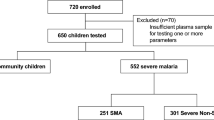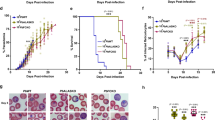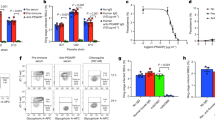Abstract
DEFICIENCY of the red cell enzyme, glucose-6-phosphate dehydrogenase (G-6-PD), predisposes erythrocytes to oxidant-induced haemolysis and is thought to protect humans against severe malaria infection. We have already shown that the malaria parasite exerts an oxidant stress on infected red cells and suggested that premature lysis of malaria infected erythrocytes might occur in G-6-PD deficient humans1, thus limiting the severity of infection by enforcing the release of immature parasites incapable of propagating the infection2.
This is a preview of subscription content, access via your institution
Access options
Subscribe to this journal
Receive 51 print issues and online access
$199.00 per year
only $3.90 per issue
Buy this article
- Purchase on Springer Link
- Instant access to full article PDF
Prices may be subject to local taxes which are calculated during checkout
Similar content being viewed by others
References
Etkin, N. L., and Eaton, J. W., in Erythrocyte Structure and Function (edit. by Brewer, G. J.), 219–232 (Liss, New York, 1975).
Ladda, R., Aikawa, M., and Sprinz, H., J. Parasitol., 55, 633–644 (1969).
Powell, R. D., and Brewer, G. J., Amer. J. trop. Med. Hygiene, 14, 358–362 (1965).
Livingstone, F. B., A. Rev. Gen., 5, 33–64 (1971).
Livingstone, F. B., Abnormal Hemoglobins in Human Populations, 17–21 (Aldine, New York, 1967).
Luzatto, L., Usanga, E. A., and Reddy, S., Science, 164, 839–842 (1969).
Horwitt, M. K., Harvey, C. C., Duncan, G. D., and Wilson, W. C., Am. J. clin. Nutr., 4, 408–419 (1956).
Gordon, H. H., Nitowsky, H. M., and Cornblath, M., Amer. J. Dis. Childh. 90, 669–681 (1955).
Rose, C. S., and Gyöorgy, P., Blood, 5, 1062–1074 (1950).
Murray, M. J., Murray, A. B., Murray, M. D., and Murray, C. L., Lancet, i, 1283–1285 (1976).
Caasi, P. I., Hauswirth, J. W., and Nair, P. P., Ann. N. Y. Acad. Sci., 203, 93–102 (1972).
Cohen, G., in Erythrocyte Structure and Function (edit by Brewer, G. J.), 685–709 (Liss, New York, 1975).
Hashim, S. A., and Schuttringer, G. R., Am. J. clin. Nutr., 19, 137–145 (1966).
Jacob, H. S., and Lux, S. E., Blood, 32, 549–568 (1968).
Godfrey, D. G., Expl Parasitol., 6, 555–565 (1957).
Coatney, G. R., and Greenberg, J., J. Parasitol., 47, 601–604 (1961).
Yarrington, J. T., Whitehair, C. K., and Corwin, R. M., J. Nutr., 103, 231–241 (1973).
Author information
Authors and Affiliations
Rights and permissions
About this article
Cite this article
EATON, J., ECKMAN, J., BERGER, E. et al. Suppression of malaria infection by oxidant-sensitive host erythrocytes. Nature 264, 758–760 (1976). https://doi.org/10.1038/264758a0
Received:
Accepted:
Issue Date:
DOI: https://doi.org/10.1038/264758a0
This article is cited by
-
Ultrastructural assessment of Plasmodium falciparum in age-fractionated thalassaemic erythrocytes
Parasitology Research (2006)
-
Oxidative stress in malaria; implications for prevention and therapy
Pharmacy World and Science (1996)
-
Cultural and genetic adaptations to malaria: Problems of comparison
Human Ecology (1986)
Comments
By submitting a comment you agree to abide by our Terms and Community Guidelines. If you find something abusive or that does not comply with our terms or guidelines please flag it as inappropriate.



